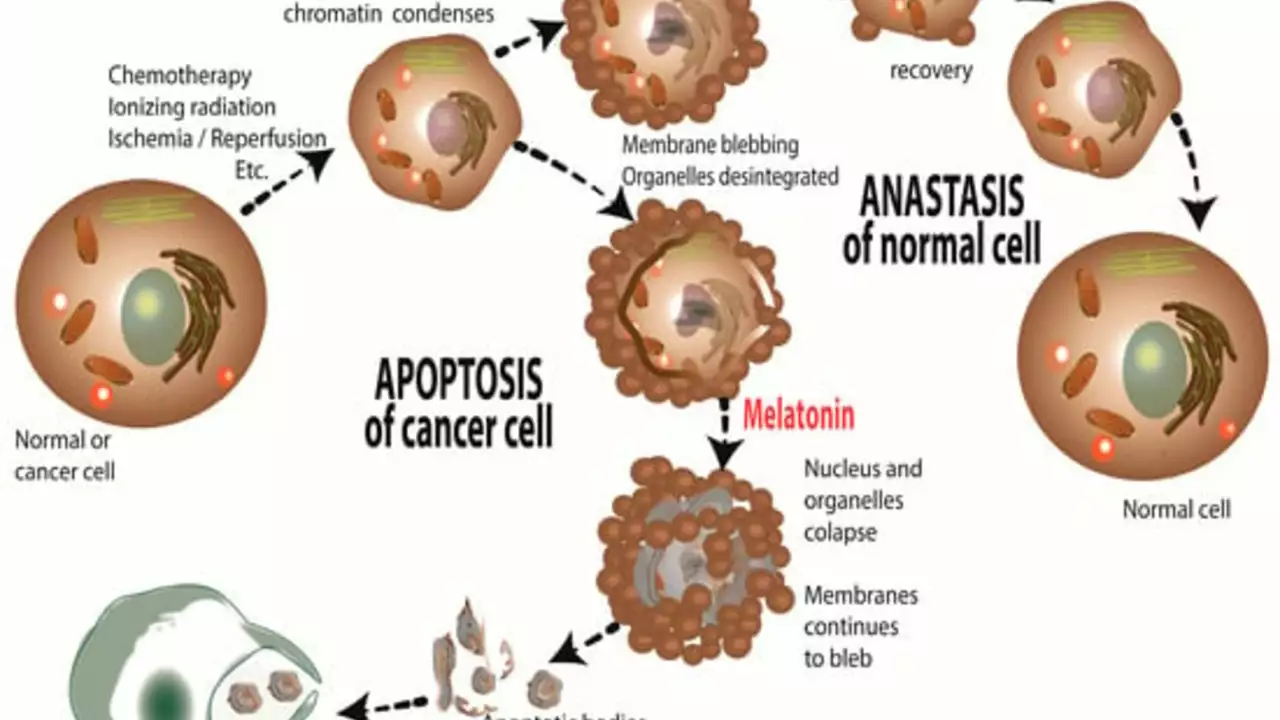Understanding Melatonin and Its Functions
Before we begin exploring the relationship between melatonin and autophagy, it's essential to understand what melatonin is and its role in our bodies. Melatonin is a hormone produced by our pineal gland, primarily responsible for regulating our sleep-wake cycle. It's often called the 'sleep hormone,' as its production increases in darkness and decreases during daylight, helping us to fall asleep at night.
But melatonin's role is not limited to sleep regulation. It also has powerful antioxidant properties, can boost our immune system, and plays a vital role in maintaining our body's circadian rhythms. Recent research suggests that melatonin may also be involved in cellular cleansing through a process called autophagy. But what exactly is autophagy?
Demystifying Autophagy: The Cellular Cleansing Process
Autophagy, derived from the Greek words for "self-eating," is a natural process where our body cleans out damaged cells to regenerate newer, healthier cells. It's like an internal recycling system, ensuring that our bodies are running efficiently and effectively. When this process is disrupted, it can lead to a variety of health problems, including neurodegenerative diseases, infections, and even cancer.
Autophagy is crucial for cellular health and longevity. It helps to remove toxins and waste from our cells, maintain energy levels, and prevent cellular damage. This process is tightly regulated by several genes and molecules, and recent research suggests that melatonin may be one of them.
Exploring the Link between Melatonin and Autophagy
Research has shown that melatonin can induce autophagy in various cells, including brain cells and liver cells. This hormone seems to activate the process of autophagy, helping to remove damaged cells and reduce inflammation. Therefore, it's possible that melatonin could be used to boost the body's natural cellular cleansing process and promote overall health and longevity.
However, it's important to note that this research is still in its early stages, and more studies are needed to fully understand the relationship between melatonin and autophagy. But the initial findings are certainly promising and suggest that melatonin could play a crucial role in maintaining cellular health.
Implications of Melatonin-Induced Autophagy for Human Health
If melatonin can indeed boost autophagy, it could have significant implications for human health. For instance, it could potentially be used to slow down the aging process, as autophagy is known to decline with age. It could also be used to treat or prevent various diseases associated with impaired autophagy, such as neurodegenerative diseases and certain types of cancer.
Moreover, since melatonin is a natural hormone with few side effects, it could provide a safe and effective way to boost autophagy and promote cellular health. However, as mentioned earlier, more research is needed to fully explore these possibilities.
Final Thoughts: Melatonin, Autophagy, and the Future of Health
In conclusion, the potential link between melatonin and autophagy is an exciting area of research that could have significant implications for human health. By boosting our body's natural cellular cleansing process, melatonin could potentially help slow down the aging process and prevent various diseases.
However, it's important to remember that this research is still in its early stages, and more studies are needed before any conclusions can be drawn. But the initial findings are certainly promising, and we can look forward to seeing what future research has to reveal about the incredible potential of melatonin and autophagy.


I don't know why everyone's so excited about melatonin... I've been taking it for years and I still wake up feeling like a zombie who lost a fight with a alarm clock. And autophagy? Sounds like some sci-fi junk they made up to sell supplements. My grandma ate lard and smoked cigars and lived to 98. No melatonin. No 'cellular cleansing'. Just good ol' stubbornness and fried potatoes.
You people are so gullible. Melatonin is a patent-controlled sleep drug disguised as a 'natural supplement'. The FDA doesn't regulate it because Big Pharma wants you to believe you need it. Meanwhile, China and Russia have been quietly studying circadian disruption as a weapon since the 80s. You think this is about health? It's about control. And if you're taking it, you're already part of the experiment. Don't say I didn't warn you.
I've been researching this for 14 years and I'm the only one who gets it. Melatonin doesn't just trigger autophagy - it unlocks your DNA's hidden firmware. The pineal gland is a quantum antenna, and when you take melatonin at 2:17 AM under a full moon (not during a lunar eclipse, that's dangerous), you activate your body's ancient alien repair protocol. I've seen it. My cat started glowing. My Wi-Fi stopped working. Coincidence? I think NOT. 🌙🔮 P.S. If you're reading this and your phone vibrates, you're already infected.
The science is clear: melatonin modulates autophagy pathways via SIRT1 and AMPK activation in multiple tissue types. This is not speculation. Peer-reviewed studies from Nature Cell Biology and Cell Metabolism confirm this mechanism. If you're considering supplementation, consult a physician. Do not self-prescribe based on Reddit threads. Health is not a trend. It's biology.
I mean... like... wow. I just sat here after reading this and I felt this deep cosmic shift. Like, melatonin isn't just a hormone - it's the universe whispering through your pineal gland saying 'hey baby, time to clean house'. I cried. I meditated. I burned sage. I drank a shot of apple cider vinegar with honey because I'm a spiritual warrior. This isn't science. This is sacred. We're all just stardust trying to purge the dark energy of modern life. And if you don't feel it... you're not awake yet. 🌌✨ #AutophagyIsMyTherapy #MelatoninIsMySoul